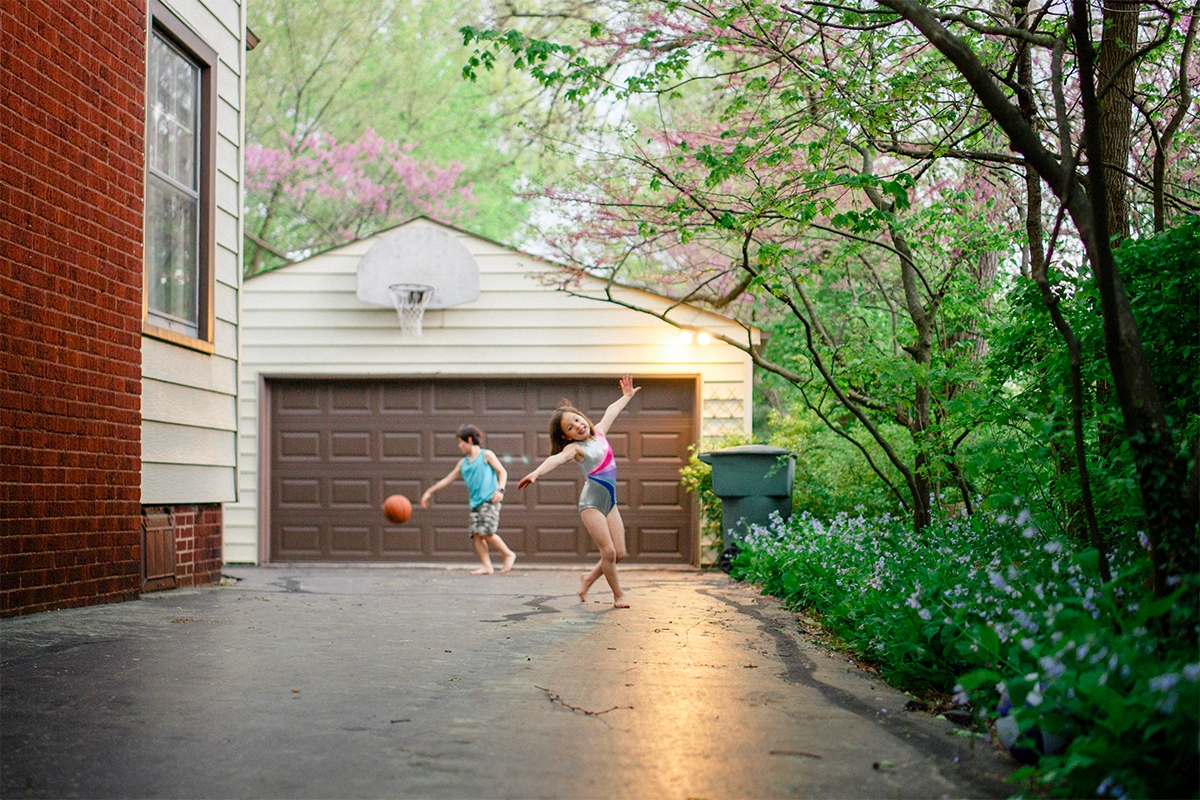It’s almost dinnertime, and in a perhaps overly familiar parenting tableau, I am standing at the counter plating my kids’ food and scarfing down bites of my own. My husband walks into the kitchen.
“Sit!” he says. “Sit while you eat!”
This is a big thing for Marc, who has told me more than once, “Jews sit when they eat.”
Many a generalization has been made about the Jewish people. This, for me, was a new one, and something I always meant to fact check but never did.
He’s probably not wrong, though, that focusing on one’s food is a good idea (for people of all religious backgrounds and affiliations). Focusing in general, really.
Too many times I find myself entering a room and not remembering why. I’ll check my phone without consciously considering whether there’s any reason to check my phone, or even whether I want to be checking it. Then I’ll check it again.
I’ve started to notice that, even when I’m with my kids, I always seem to be elsewhere. Packing their lunches while they eat their breakfast. Loading the diaper bag while they turn the couch into a fort. Listening to a very animated story about a dream they may or may not have actually had, but also thinking about when we need to leave if we want to make it home for naptime. On the floor building blocks with them one second, reaching over to gather and put away scattered Hot Wheels the next.
None of us should self-flagellate too much about this. There’s a lot to juggle as a parent and as a human. Someone has to pack the lunches. Minds wander. And, really, playtime isn’t always all that engaging. It doesn’t take the whole adult brain to send a toy car down a plastic ramp.
Still, I can’t shake the feeling that I’m always around my children, but never quite there. Or at least not as present as I’d like to be. They’re little and cute and interesting and I want to enjoy them. And I don’t want to be remembered in their memoirs as just a pair of legs, like the grownups in “Muppet Babies.”
So I’ve been making some effort, checking out library books on meditation and presence in hopes of reading my way into mindfulness. But I never really thought of it as a Jewish thing.
My husband explained it to me this way: “Jews are supposed to do everything with a purpose and make everything holy. That’s why there are prayers for before we do anything. You can’t be thankful for your food if you’re doing other things while you eat it.”
Pretty good for a guy with no formal Jewish education beyond his bar mitzvah. Marc’s idea of a Judaism-mindfulness connection whet my appetite (pun intended but probably ill advised), so I sought out the rabbi of our local Chabad, where my children go to preschool. I told him Marc says Jews sit when they eat. He laughed.
The rabbi agreed, though, that part of the function of prayer (eating-related and otherwise) is to bring us into the moment — so long as it’s not lip service, so long as you’re really there each time you pray. By divine providence, he said, each moment you are where you’re supposed to be. So be there.
I’m working on it. If not the praying, at least the being there. Trying to do one thing at a time, or to at least briefly turn away from the sink to make eye contact with a family member who’s speaking to me — that sort of thing.
The other day, I was ricocheting bouncy balls around the neighborhood basketball court with my youngest son, and I found my mind had wandered to the day’s to-do list. I shook my head and tried to tune back in, making mental observations like, “I hear the ball thwacking the court. I hear Benji’s happy little shrieks. I see he’s wearing his blue shirt.”
And then I realized: We’ve owned this shirt for three years. It was his brother’s before it was his. I have washed and folded this shirt a thousand times and yanked it over a little blond head and then a little brown one just as many. I knew it had a skier on it. But I had never read the shirt. Never! I couldn’t have told you what it said if you paid me.
Of course, it’s not what it says on the shirt that’s important (“I do all my own stunts”). I could’ve gone my whole life never having read the shirt and been fine. But it just shows how you can look at something and look at something and look at something without really seeing it.
I’m tired of not seeing.
I’ve been trying a lot of little tricks for zoning back in when I’m zoned out, like the observation exercise that led to shirtgate, or taking a deep breath and remembering something I read by Zen Master Thich Nhat Hanh: “Breathing in, I know that I am breathing in.” And lately, a new one: I say to myself, “Hineni,” which means in Hebrew, “Here I am.” During High Holiday services, we read of Abraham answering God that way, and this year it stuck with me. I’ve probably taken it completely out of context for my own personal use, but it turns out it’s a pretty good mantra.
Hineni, here I am. Here on the floor building a train track with my giggly kids. Here on the Starbucks patio writing on a breezy day. Here with my husband on a lunch date because he left work early to spend time with me. Even during bedtime, when someone’s thirsty and someone can’t find their blanket and everything’s wet from bath time and all I can think about is getting downstairs — hineni, I am here, and I know I am here.
Using a Hebrew term to practice presence has helped it click for me, helped me better enjoy the precious moments and keep my cool during (some of) the frustrating ones. And I feel even more drawn and connected to mindfulness knowing it’s a Jewish practice.
Renowned British Rabbi Jonathan Sacks, in his “Letters to the Next Generation,” wrote, “The whole of Judaism is a sustained discipline in not taking life for granted: the thanks we say in our prayers, the blessings we make over every pleasure, the way kashrut turns eating into a holy act and the laws of Jewish family life sanctify the act of love. Shabbat stops us from traveling through life so fast that we never get to enjoy the view.”
The rebbetzin and head of our preschool put it this way: “The Torah is mindfulness.” Everyone has a God-given purpose, she said. Rituals and practices can help foster the gratitude, joy and presence needed to find that purpose.
I don’t know whether I’ll ever keep strictly kosher or start praying when I wash my hands, but this Jewish notion of taking note of and appreciating where you are, what you’re doing, what you have — of not letting life pass by — resonates deeply.
My divine purpose has yet to be revealed, but I’m probably not going to find it scrolling around my phone. I know it goes beyond meal planning in my head or collecting errant Legos when I could be engaging with my family or otherwise experiencing life.
And I am here for it.








